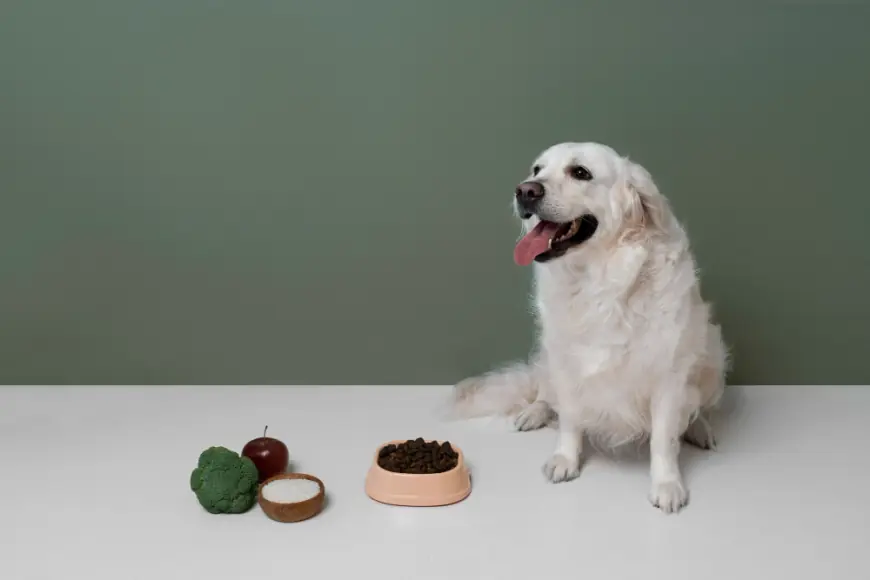Probiotic Supplements vs. Food: What’s Better for Your Dog?
In this article, we’ll explore the role of probiotics in your dog’s health, compare the benefits of supplements and foods, and provide tips for incorporating the right probiotics into your dog’s diet.

better digestion, improved immunity, and overall wellness for your furry friend. But when it comes to choosing a probiotic for dog, you might wonder whether supplements or probiotic-rich foods are the better option. Both have their unique advantages, and understanding their differences is key to making the best choice for your pup’s health.
In this article, we’ll explore the role of probiotics in your dog’s health, compare the benefits of supplements and foods, and provide tips for incorporating the right probiotics into your dog’s diet.
What Are Probiotics, and Why Are They Important for Dogs?
Probiotics are live microorganisms, primarily beneficial bacteria, that support the gut microbiome—a collection of bacteria, fungi, and other microbes in the digestive tract. These “good bacteria” play a critical role in maintaining your dog’s health by:
- Promoting Healthy Digestion: Probiotics help break down food, absorb nutrients, and prevent digestive issues like diarrhea and constipation.
- Boosting Immunity: A balanced gut microbiome strengthens the immune system, protecting your dog from infections and illnesses.
- Improving Skin and Coat Health: Probiotics can reduce inflammation, alleviate allergies, and promote a shiny coat.
- Enhancing Overall Well-Being: A healthy gut contributes to better energy levels, mood, and quality of life.
Probiotic Supplements for Dogs: The Pros and Cons
Probiotic supplements are formulated specifically for dogs and are available in various forms, including powders, capsules, chews, and liquids. They typically contain strains of bacteria like Lactobacillus, Bifidobacterium, and Enterococcus, tailored to canine gut health.
Pros of Probiotic Supplements
- Targeted Formulation: Supplements are designed to meet the unique needs of dogs, often containing specific strains that address common canine issues like diarrhea, bloating, and allergies.
- Ease of Use: Most supplements are convenient to administer, either mixed into food or given as a treat.
- Higher Potency: Supplements often contain a higher concentration of live bacteria (measured in CFUs—colony-forming units), ensuring effective gut colonization.
- Consistency: Supplements provide a controlled dosage, making it easier to monitor your dog’s intake and results.
Cons of Probiotic Supplements
- Cost: High-quality probiotic supplements can be expensive, especially for long-term use.
- Artificial Additives: Some products may include fillers, artificial flavors, or preservatives, which can be harmful to sensitive dogs.
- Trial and Error: Finding the right supplement for your dog may require experimentation, as not all probiotics work the same for every pet.
Probiotic Foods for Dogs: The Pros and Cons
Probiotic-rich foods are a natural way to boost your dog’s gut health. These foods include items naturally high in live cultures or those fortified with probiotics.
Common Probiotic Foods for Dogs
- Yogurt: Plain, unsweetened yogurt with live cultures.
- Kefir: A fermented milk drink that’s rich in probiotics.
- Fermented Vegetables: Small amounts of sauerkraut or pickles (without added salt or spices).
- Bone Broth: Helps support gut health and is often enriched with probiotics.
Pros of Probiotic Foods
- Natural Source: Probiotic foods provide a wholesome and chemical-free way to introduce beneficial bacteria.
- Additional Nutrients: These foods often contain vitamins, minerals, and enzymes that support overall health.
- Cost-Effective: Foods like yogurt and kefir are more affordable than many supplements and readily available.
- Flavorful: Dogs typically enjoy the taste of probiotic foods, making it easy to include them in meals.
Cons of Probiotic Foods
- Lower Potency: The concentration of live bacteria in foods is generally lower than in supplements, making it harder to achieve therapeutic effects.
- Lactose Sensitivity: Some dogs may struggle to digest dairy-based probiotics like yogurt or kefir.
- Inconsistency: The amount of probiotics in foods can vary, leading to less predictable results.
- Risk of Additives: Many commercial products, like flavored yogurts, contain added sugar or artificial ingredients that are harmful to dogs.
Comparing Probiotic Supplements and Foods
| Feature | Probiotic Supplements | Probiotic Foods |
|---|---|---|
| Potency | High, with standardized CFU counts. | Lower, and CFU counts are not standardized. |
| Convenience | Easy to administer; available in pre-measured doses. | Requires preparation and portion control. |
| Cost | More expensive, especially high-quality options. | Generally more affordable and widely available. |
| Customization | Tailored for specific health conditions. | Limited to general gut health benefits. |
| Digestibility | Designed for dogs, minimizing risks of intolerance. | Some dogs may struggle with dairy or fermented foods. |
When Should You Choose Probiotic Supplements?
- Chronic Digestive Issues: If your dog suffers from frequent diarrhea, gas, or bloating, supplements offer a potent and reliable solution.
- Antibiotic Use: Antibiotics disrupt the gut microbiome. Probiotic supplements can restore balance more effectively than food.
- Immune Support: Dogs with weakened immunity due to age, illness, or stress may benefit from the targeted strains in supplements.
- Specific Health Goals: Supplements are ideal for addressing conditions like allergies, skin problems, or anxiety.
When Should You Choose Probiotic Foods?
- General Maintenance: For healthy dogs without specific issues, probiotic-rich foods can support gut health as part of a balanced diet.
- Cost-Saving Option: If supplements are out of your budget, natural foods are an affordable alternative.
- Food-Enthusiastic Dogs: Picky eaters who enjoy the taste of yogurt, kefir, or fermented vegetables may respond well to food-based probiotics.
- Holistic Approach: If you prefer natural remedies, probiotic foods align with your values.
How to Introduce Probiotics to Your Dog
1. Start Slowly
Introduce probiotics gradually to avoid overwhelming your dog’s digestive system. Begin with a small dose and increase as tolerated.
2. Monitor Your Dog’s Reaction
Watch for signs of improvement in digestion, coat quality, and energy levels. Also, note any adverse reactions, such as diarrhea or gas, which may indicate an intolerance.
3. Consult Your Veterinarian
Before adding probiotics to your dog’s diet, consult your vet, especially if your dog has pre-existing conditions or takes medications.
Tips for Choosing a Probiotic Supplement for Dogs
- Look for High CFU Counts: Choose products with at least 1 billion CFUs per serving for effective results.
- Check for Multiple Strains: A diverse mix of bacteria strains offers broader benefits.
- Ensure Quality Standards: Select brands certified by reputable organizations like the National Animal Supplement Council (NASC).
- Avoid Artificial Additives: Opt for natural formulations without unnecessary fillers.
DIY Probiotic Recipes for Dogs
-
Yogurt Topper
- Mix a spoonful of plain, unsweetened yogurt into your dog’s food for a probiotic boost.
-
Kefir Treats
- Freeze kefir in silicone molds to create tasty, gut-healthy snacks.
-
Fermented Vegetable Mash
- Blend small amounts of sauerkraut with your dog’s regular food (ensure it’s low-sodium and spice-free).
-
Bone Broth Mix
- Add a dash of probiotic powder to homemade bone broth for a nutritious, probiotic-rich meal addition.
Final Thoughts:
The choice between probiotic supplements and food depends on your dog’s individual needs, health goals, and your lifestyle. Supplements offer precision, potency, and targeted benefits, making them ideal for dogs with specific health concerns. On the other hand, probiotic-rich foods are a natural, cost-effective option for maintaining gut health in otherwise healthy dogs.
Ultimately, the best approach may involve a combination of both supplements and food. By consulting your veterinarian and observing your dog’s response, you can develop a plan that supports your furry friend’s digestive health and overall well-being.
What's Your Reaction?
 Like
0
Like
0
 Dislike
0
Dislike
0
 Love
0
Love
0
 Funny
0
Funny
0
 Angry
0
Angry
0
 Sad
0
Sad
0
 Wow
0
Wow
0





















































